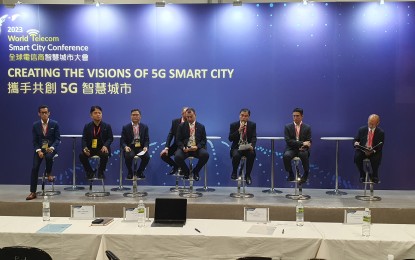
BUILDING SMART CITIES. International experts serve as panelists during the 2023 World Telecom Smart City Conference at the Taipei Nangang Exhibition Hall 2 (TaiNEX 2) on Wednesday (March 29, 2023). From improving city management through e-governance, boosting business opportunities using artificial intelligence and the cloud, as well as helping create safer public spaces through smart cameras and police cars, smart cities are now a reality for many first-world countries and a model to emulate for developing nations. (PNA photo by Raymond Carl dela Cruz)
TAIPEI, Taiwan – The coronavirus disease 2019 (Covid-19) pandemic has highlighted the need for smart cities to leverage 5G technologies to improve public services, health, safety and sustainability due to its effect on the public’s mobility.
From improving city management through e-governance, boosting business opportunities using artificial intelligence (AI) and the cloud, as well as helping create safer public spaces through smart cameras and police cars, smart cities are now a reality for many first-world countries and a model to emulate for developing nations.
However, harnessing such technologies on a city-wide scale is a challenge that many governments cannot face on their own.
This was the topic of a panel discussion among experts from different countries and sectors at the 5G Smart City Summit 2023, held at the Taipei Nangang Exhibition Hall 2 on Wednesday.
Dr. Pairoj Likitthanasate, vice president of the National Telecom Public Company Ltd. in Thailand, said smart cities cannot be profitable by themselves and require funding from the government and assistance from the private sector.
He cited the example of Pattaya City, where the Thai government partnered with several private companies to support the city in handling the pandemic by implementing 5G technologies such as the smart pole.
These smart poles are equipped with WiFi, closed-circuit television (CCTV) cameras, street lights, and light-emitting diodes (LED) screens.
Due to the enormous cost of such equipment, Fabiano Vergani, director of the National Telecommunications Agency of Brazil, said developing public-private partnerships (PPP) is an important step in developing and implementing smart cities.
“The governments at our level do not have resources to implement by themselves. So, it is of major importance to unite the public and private sectors,” Vergani said.
PPPs, he said, are a “great enhancement” for the public sector, with several PPP projects being developed in Brazil, especially on the installation of smart poles.
Vergani said PPPs are also important to reach rural areas, such as the Amazon rainforest, where satellite internet providers like Starlink could play a role.
"It will require an enormous resource to connect this region with 5G. It will need internet companies that use satellites. Starlink will be an important company to bring internet connection to this region," he added.
Vergani also underscored the important role of academia in bringing such projects to life.
“We need to develop applications and the participation of universities is of fundamental importance because it is important to research and analyze public databases. Because there are laws that protect user data,” he said.
Kyoung Jun Lee, a leading AI researcher from the Department of Business, Big Data Analytics, and Tech Business of Kyung Hee University in South Korea, said smart cities should be implemented in an open approach and allow competing private companies to share projects.
Many smart city projects in Busan failed when some telecommunications companies (telcos) monopolized these projects, Lee said.
He said such partnerships are possible without sharing sensitive and protected information by shifting from data sharing to AI sharing.
"The government and telcos should seriously consider the use of AI and should change their mind from data sharing to AI sharing. We can create value and we can develop innovative services for smart cities," he added.
Paul Wang, vice president of Taiwan Mobile, said that once smart cities are built, the ecosystems used would be easier to replicate in other places.
The panel discussion was held during the 2023 World Telecom Smart City Conference with the theme, “Creating the visions of 5G Smart City.”
It was held during the Smart City Summit & Expo in Taipei, a four-day summit from March 28 to 31 that aims to promote the development of smart cities and related technologies. (PNA)
